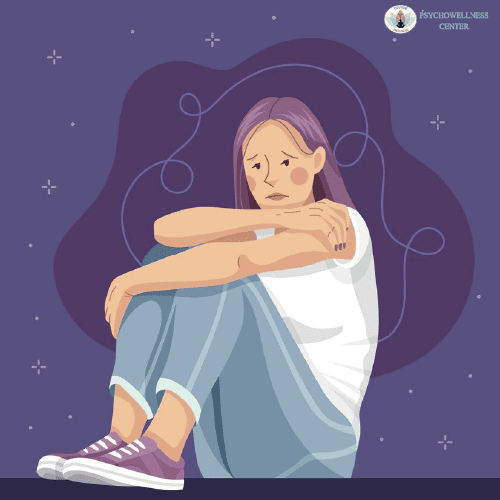Loneliness is an increasingly recognized issue among adolescents, affecting their mental well-being and overall quality of life. This blog explores the rise of loneliness in this age group, examining its causes, effects on mental health, and possible solutions. It also highlights how therapists from the Psychowellness Center can assist adolescents in overcoming loneliness and improving their emotional well-being.
Causes of Loneliness in Adolescence
Several factors contribute to the rise of loneliness among adolescents. The extensive effect of social media is one of the main causes. While platforms like Instagram, Snapchat, and TikTok offer opportunities for connection, they often exacerbate feelings of isolation. Adolescents may compare themselves unfavorably to others, leading to a distorted self-image and a sense of inadequacy (Vogel et al., 2014). Additionally, the constant need for validation through likes and comments can deepen feelings of loneliness when these needs are unmet (Perloff, 2014).
Another significant cause is the increasing pressure to conform to societal expectations. Adolescents face high academic and social pressures, which can lead to feelings of alienation if they perceive themselves as failing to meet these expectations. A 2019 study by Twenge et al. found that teens’ feelings of loneliness have increased in tandem with their levels of academic stress.
Furthermore, familial and relational factors play a critical role. Adolescents who experience family instability, such as divorce or conflict, may struggle with loneliness as they feel disconnected from their support systems. Lack of strong, supportive relationships with family members can heighten feelings of isolation (Kearns & Sweeney, 2017).
Effects of Loneliness on Mental Health
Adolescents’ psychological and emotional health can be severely impacted by loneliness. Research indicates that chronic loneliness is associated with an increased risk of developing mental health issues such as depression, anxiety, and low self-esteem (Hawkley & Cacioppo, 2010). Adolescents who feel isolated are more likely to experience symptoms of depression, including persistent sadness and a lack of interest in activities they once enjoyed.
Moreover, loneliness can impair cognitive and social functioning. Studies have shown that lonely adolescents may have difficulties with concentration and memory, which can affect their academic performance and social interactions (Cacioppo et al., 2011). The lack of meaningful social connections can lead to a decline in social skills, making it even more challenging for these individuals to form new relationships.
How Therapists from the Psychowellness Center Can Help
Adolescent loneliness must be addressed with compassion and in a number of strategies. Therapists from the Psychowellness Center are well-equipped to provide support and strategies to help adolescents overcome loneliness and improve their mental well-being.
- Therapeutic Interventions: Therapists can use various therapeutic techniques to address loneliness. Cognitive Behavioral Therapy (CBT) is particularly effective in helping adolescents reframe negative thought patterns and develop healthier ways of thinking about themselves and their social interactions. Through CBT, adolescents can learn to challenge their perceptions of social inadequacy and build more positive self-views (Beck, 2011).
- Building Social Skills: Many therapists focus on enhancing social skills to help adolescents feel more confident in social situations. This may involve role-playing exercises, social skills training, and strategies for effective communication. By improving their social skills, adolescents can better navigate social interactions and build meaningful relationships (LeCroy, 2014).
- Support Systems and Coping Strategies: Therapists also work with adolescents to develop coping strategies and support systems. This may include encouraging participation in extracurricular activities, fostering connections with peers who share similar interests, and building a strong support network of friends and family. By establishing a robust support system, adolescents can reduce feelings of isolation and enhance their overall emotional resilience (Parker et al., 2016).
- Mindfulness and Stress Reduction: Incorporating mindfulness and stress reduction techniques can be beneficial for managing loneliness. Therapists may guide adolescents in practices such as mindfulness meditation, which can help them become more aware of their thoughts and feelings, reduce stress, and improve their emotional regulation (Kabat-Zinn, 1990).
Conclusion
Loneliness among adolescents is a growing concern with significant implications for mental health. The rise of social media, academic pressures, and family dynamics contribute to feelings of isolation, which can lead to severe emotional and psychological consequences. However, with the support of skilled therapists from the Psychowellness Center, adolescents can find effective ways to cope with loneliness, improve their social skills, and build meaningful connections. By addressing loneliness through therapeutic interventions and support, adolescents can enhance their overall well-being and achieve a more fulfilling social life.
Contribution:- Renowned psychologists Dr. R K Suri and Ms. Sakshi Dhankhar counselling psychologist provide their services at Psychowellness Center through TalktoAngel.
References
- Beck, J. S. (2011). Cognitive behaviour therapy: Basics and beyond. Guilford Press.
- Cacioppo, J. T., Cacioppo, S., & Boomsma, D. I. (2011). Evolutionary perspectives on social behaviour. In P. K. Smith & C. H. Hart (Eds.), The Wiley-Blackwell Handbook of childhood social development (pp. 389-406). Wiley-Blackwell.
- Hawkley, L. C., & Cacioppo, J. T. (2010). Loneliness matters: A theoretical and empirical review of consequences and mechanisms. Annals of Behavioral Medicine, 40(2), 218-227. https://doi.org/10.1007/s12160-010-9210-8
- Kabat-Zinn, J. (1990). Full catastrophe living: Using the wisdom of your body and mind to face stress, pain, and illness. Delta.
- Kearns, A., & Sweeney, C. (2017). The impact of family instability on adolescent well-being. Family Relations, 66(4), 482-496. https://doi.org/10.1111/fare.12261

